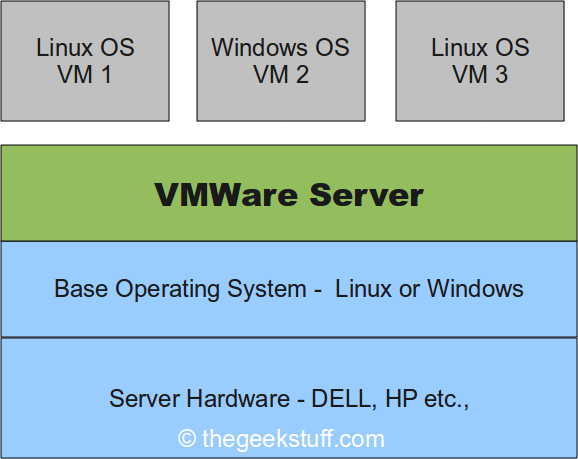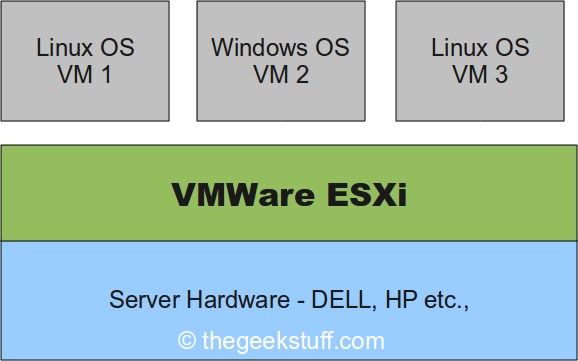We are starting a new series of articles on VMware that will help you install, configure and maintain VMware environments.
In this first part of the VMware series, let us discuss the fundamental concepts of virtualization and review the VMware virtualization implementation options.
Following are few reasons why you might want to think about virtualization for your environment.
- Run multiple operation systems on one server. For example, instead of having development-server and QA-server, you can run both development and QA on a single server.
- You can have multiple flavours of OS on one server. For example, you can run 2 Linux OS, 1 Windows OS on a single server.
- Multiple OS running on the server shares the hardware resources among them. For example, CPU, RAM, network devices are shared among development-server and QA-server running on the same hardware.
- Allocate hardware resources to different applications based on the utilization. For example, if you have 8GB of RAM on the server, you can assign less RAM to one virtual machine (2GB to development-server) and more RAM (6GB to QA-server) to another virtual machine that is running on that server
- High availability and business continuity. If VMware is implemented properly, you can migrate a virtual machine from one server to another server quickly without any downtime.
- This reduces the operational cost and power consumption. For example, instead of buying and running two servers, you will be using only one server and run both development and QA on it.
On a high level, there are two ways for you to get started on the virtualization using VMware products. Both of these are available for free from VMware.
1. VMware Server
VMware Server runs on top of an existing host operating system (either Linux or Windows). This is a good option to get started, as you can use any of the existing hardware along with it’s OS. VMware server also support 64-bit host and guest operating system. You also get VMware Infrastructure web access management interface and Virtual Machine console.
 Fig: Virtual Machine running on top of VMware Server
Fig: Virtual Machine running on top of VMware Server
2. VMware ESXi
VMware ESXi is based on the hypervisor architecture. VMware ESXi runs directly on the hardware without the need of any host operating system, which makes is extremely effective in terms of performance. This is the best option to implement VMware for production usage.
 Fig: Virtual Machine running on top of VMware ESXi
Fig: Virtual Machine running on top of VMware ESXi
Following are some of the key features of VMware ESXi:
- Memory compression, over commitment and deduplication.
- built-in high available with NIC teaming and HBA multipathing.
- Intelligent CPU virtualization
- Highly compatible with various servers hardware, storage and OS.
- Advanced security with VMSafe, VMKernel protection and encryption.
- Easy management using vsphere client, vCenter server and command line interface






 My name is Ramesh Natarajan. I will be posting instruction guides, how-to, troubleshooting tips and tricks on Linux, database, hardware, security and web. My focus is to write articles that will either teach you or help you resolve a problem. Read more about
My name is Ramesh Natarajan. I will be posting instruction guides, how-to, troubleshooting tips and tricks on Linux, database, hardware, security and web. My focus is to write articles that will either teach you or help you resolve a problem. Read more about
Comments on this entry are closed.
for *nix folks, it might be interesting to note ESXi has busybox based command line, dropbear ssh server, some essential *nix commands plus ESX commands are available. Otherwise, there is the Remote Command Line (rCLI) or vMA, an appliance which is actually a pre-built virtual machine based in Linux.
WMware Server and WMware ESXi – typos?
First one is workstation or Vmware player not Vmware server
sun’s virtual box is also quite good. Can you cover this as well in your articles.
WMWare?
Basavaraju, actually the first one is VMware Server. Server is based on the same tech that is in Workstation & Player. It runs on top of a base OS rather than installing onto bare metal hardware. See http://www.vmware.com/products/server/faqs.html
@kevit, Edward,
Thanks for pointing out the typo. It’s fixed now.
Thank you –
I am trying to study for my VMware Exam – struggling with it – so I hope that your series will help me understand it a little more.
There are three type products from Vmware
1.Vmware workstation (Hosted on Linux or Windows)
2.Vmware ESX server (Contains RHEL based Service console )
3.Vmware ESXi (Only Vmkernel Hypervisor,No Service console)
Basavaraju,
That’s definitely over-simplifying it. http://www.vmware.com/products/
VMware Server != VMware ESX/ESXi – they are 2 very different products (the disk image formats they both use aren’t even compatible – you have to manually convert between the two). There is also VMware Fusion which is the workstation “equivalent” to Workstation on Windows/Linux (only marginally so). In addition to that, there is VMware Player which doesn’t have any of the ability to create/manage VMs that Workstation/Fusion/Server have. Finally there is a whole host of management products to actually work with the VMs in a ESX/ESXi environment (generally falling under the vSphere label as well as miscellaneous additional tools).
Your list is a bit too simplistic & it’s missing some key information.
Is it Deduplication, under
“Memory compression, over commitment and dedpulication”
superbenk
I think Vmware player 3 onwards supports VM creation
very nice.thanks.
In the article above, can you help explain the below features in an easy to understand manner like how you have explained above
Following are some of the key features of VMware ESXi:
Memory compression, over commitment and deduplication.
built-in high available with NIC teaming and HBA multipathing.
Intelligent CPU virtualization
Highly compatible with various servers hardware, storage and OS.
Advanced security with VMSafe, VMKernel protection and encryption.
Easy management using vsphere client, vCenter server and command line interface
Please send some document about LDAP and application of LDAP in linux os.
Hi,
I am new to this website,and no knowledge about VMware.
I am using windiws server2003 and windows 7 on my laptop.
I want to virtualize win server 2003 on windows 7.(so that i can run windows server 2003 on windows 7)
Can anybody help with simple stepsfor the same.
Thanks in advance.
chintan
Hi All,
I am very much interested to learn VMWARE. I dont know even the basics. Can anyone send me the stuff to learn basics and how to install vmware. It will be very helpful for me. Thanks in Advance.
How do I browse to the next article on in this series, cant find the next article link?
Can someone plz tell me how to give IP’s to eth 0 and eth 1 of physical machine if i have two NIC’s in my server on which i installed vmware ESXI 5.
Regards,
Star
Really intresting …
Hi
can i convert physical machine to Vm machine, if yes, Please guide me how to do.
Regards,
Nataraj.SM
Hi All,
what is the type of VMware, if i’m going to learn VMware admin what need;s to learn?
VMware admin types(serveror client)basic VMware admin components
VMware components
Regards,
Sree
Hello everyone,
I am very much interested to learn VMWARE. I dont know the basics. Can anyone send me the study material to learn basics and how to install vmware. It will be very helpful for me. Thanks in Advance.